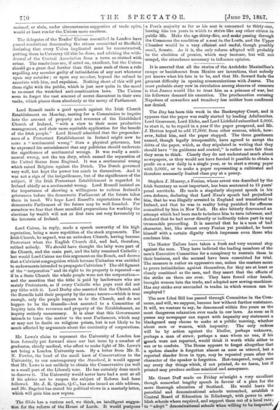Lord Cairns, in reply, made a speech unworthy of his
high reputation, being a mere repetition of the stock arguments. The Irish Church, he argued, was an unbroken Church, having become Protestant when the English Church did, and had, therefore, robbed nobody. We should have thought the laity were part of the Church, and the main part, and the laity remained Catholic ; but would Lord Cairns use this argument on the Bench, and decree that a Calvinist congregation which became Unitarian was entitled to endowments intended to propagate Calvinism? The old figment of the " corporation " and its right to its property is repeated—as if in a State Church the whole people were not the corporation— and the assertion that the tithe is paid by landowners who are mainly Protestants, as if every Catholic who pays rent did not pay tithe with it. Lord Derby also asserted that the Church and the Russells held their property by the same tenure—which is true enough, only the people happen to be the Church, and do not happen to be the Russells—but assented to a Committee of Inquiry into the revenues and property of the Establishment, an inquiry entirely unnecessary. It is clear that this Government intends to leave the matter to the next Parliament, 'which may or may not be docile on religious points, but is not likely to be much affected by arguments about the continuity of corporations.






























 Previous page
Previous page